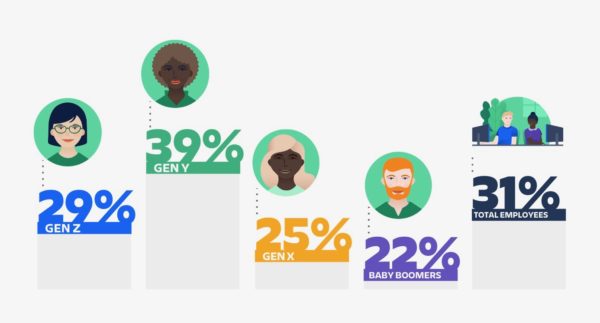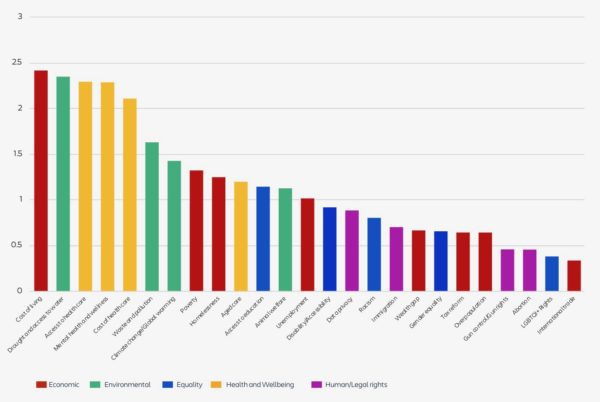New research commission by Atlassian suggests a ‘tipping point’ for business activism. Australian employees want their companies to play more of a role in societal issues, particularly the environment, healthcare, and cost of living. Such is the divorced nature of contemporary polarisation; what a child cannot obtain from one parent they’ll solicit from the other. In this case, the government has refused, and so many are taking their pleas to the market.
The study, conducted by PwC and entitled The Return on Action (ROA), suggests that traditional market abstention from social and political issues is over. Businesses now feel they must plant their flag prominently or risk losing their employees. The finding raises an interesting question though, when every business is raising their flag, how can we be sure it’s not just a windsock showing which way the wind is blowing at any given time?
The report surveyed 1,200 Australian employees across the generational divides and the expectations and accountability of businesses and moral obligations. 69% of respondents agreed businesses should be just as concerned with their societal impact as they are with their financial performance. 78% agreed businesses need to take full responsibility of their environmental impact. And a full third of those surveyed were unsatisfied with the action of their own employers.

Image: Atlassian
Mike Cannon-Brookes, Co-Founder and Co-CEO of Atlassian, said Australian businesses have reached a tipping point, and sitting on the fence is no longer good enough. “As business leaders, we have an awesome responsibility,” said Cannon-Brookes. “Employees want us to ensure we are making the planet better, not worse. Faced with government inaction on some of our biggest problems, it’s the business community that can step up and drive meaningful change.”
Scott Farquhar, the other Co-Founder and Co-CEO of Atlassian, noted that “many companies focus only on the Return on Investment and delivering profit for shareholders. But times have changed. As business leaders we should listen to the views of the workforce; focusing on our impact on society delivers a return of its own. It’s now on us to respond.”
The environment is one of the workforce’s most overarching concerns, the report found. 65% of respondents agreed or strongly agreed that the impact of climate change will become significantly worse in the next five years, and 70% believe business have enough power to stem the tide.
In a recent article published in The Australian Financial Review, Elizabeth Gaines, CEO of iron ore company Fortescue Metals Group, similarly agreed that beyond the practical concerns of business, “we need to have strong values and ensure our voice is heard in the debates on important policy issues that affect us all.”
“And we’re also taking on the biggest challenge of our generation,” continued Gaines, “which is one that we all share – reducing our emissions and contributing to global efforts to combat climate change.”
Of all generations, and this is a finding that will surprise precisely no one, it is Gen Z who are the least ambivalent about whether businesses should speak out on issues important to them. 72% of Gen Z respondents said they value businesses speaking out on their issues. The report doesn’t seem to have asked respondents if they would similarly value businesses speaking out on issues they don’t find important.
Overall, the issues revealed to be most personally important to Australian employees were cost of living, drought/access to water and health (access to health care, cost of healthcare, and mental health and wellness). Shelter, water, and health, these are not so much issues as human rights concerns. Now, it is interesting enough that Australian employees are looking to the market to provide a new social contract for those rights, the question is, what happened to the old one?

Image: Atlassian
The report, which also conducted simultaneous research in the United States, showed that people in the workforce felt that their government was not doing enough on the issues they value, or that they had lost control of their government. Subsequently, the people are turning to big business. And yet, no one seems to remember that it has been business and big business, through lobbying and special interests, which has eroded political control of government for over half a century. As Fareed Zakaria put it in his book The Future of Freedom, “the American people believe that they have no real control over government, what they do not realise is that the politicians have no control, either.”
The report seems then to highlight a significant shift, or at least raise the question, can democracy decide business with any of the success business has had in deciding democracy?
This content is protected by copyright and may not be reused. If you want to cooperate with us and would like to reuse some of our content, please contact: editors@pv-magazine.com.









By submitting this form you agree to pv magazine using your data for the purposes of publishing your comment.
Your personal data will only be disclosed or otherwise transmitted to third parties for the purposes of spam filtering or if this is necessary for technical maintenance of the website. Any other transfer to third parties will not take place unless this is justified on the basis of applicable data protection regulations or if pv magazine is legally obliged to do so.
You may revoke this consent at any time with effect for the future, in which case your personal data will be deleted immediately. Otherwise, your data will be deleted if pv magazine has processed your request or the purpose of data storage is fulfilled.
Further information on data privacy can be found in our Data Protection Policy.